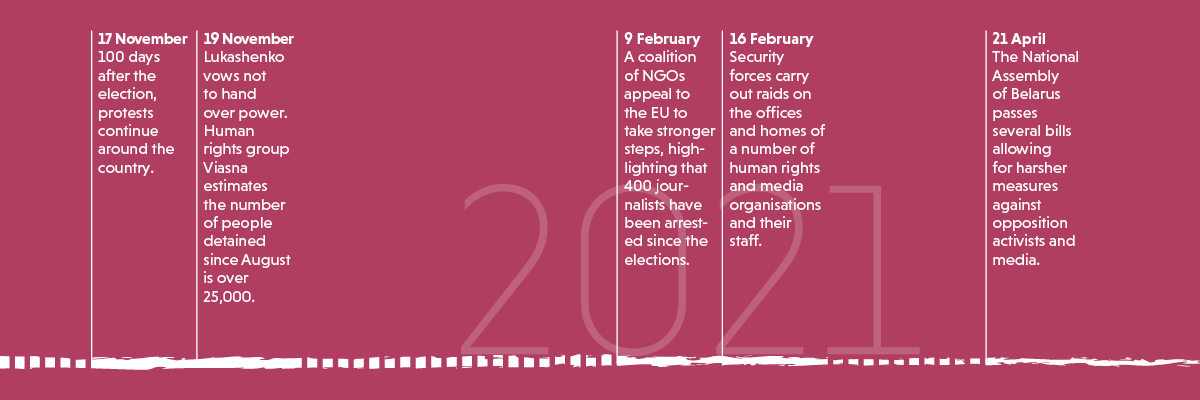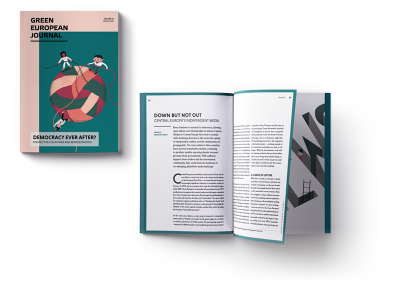A former high-ranking government official in Belarus, Pavel Latushka has witnessed President Lukashenko’s system of power from the inside. After a sham election triggered widespread protests, he joined the ranks of the resistance to the regime. Now in political exile, Latushka speaks to Roderick Kefferpütz about the struggle to keep the Belarusian pro-democracy movement alive, what makes this movement so unique, and the pressing need for Europe to take a stand in solidarity.
Roderick Kefferpütz: The Belarusian protests began before the contested August 2020 election but exploded in size after it became clear that Lukashenko had rigged the results in his favour. Can you explain how the democracy movement emerged and gathered momentum?
Pavel Latushko: Artem Sakov, Dzmitry Popau, Pavel Seviarynets, Aliaksandr Shabalin, Uladzimir Tsyganovich.
[pause]
I want to start with these five names. Today, we have 362 political prisoners in Belarus. And as of today, I have decided to begin all my interviews acknowledging their struggle by naming five of them. Europe should know their names. The rigged election was the first protest trigger. The second was the ensuing mass violence. I remember when the internet was switched off and we had a three-day information blackout. When the internet came back on, I remember receiving all these messages on my phone, showing me videos and photos of massive police brutality. It was horrible.
That’s when all of Minsk, all of Belarus decided to take to the streets. The government met these protests with even greater violence. Nine people are estimated to have been murdered over the past eight months. 35,000 people have been arrested and detained. The United Nations has recognised 4600 cases of torture. 500 journalists have been arrested. The list goes on.
Belarusians are angry and feel betrayed. We want our freedom. We are the only country in Europe that has continued to live under a dictatorship.

The movement for democracy in Belarus stands out for two reasons: the prominent participation of women and the involvement of people from the cultural world. Can you explain these two dynamics and what they brought to the struggle?
This is unique for our movement. Three women are the leaders of our protest. They dared to stand up for their husbands, their families, and people close to them. They were the spark that gave others the courage to do the same. I remember seeing these women on TV and I thought to myself: as a man, if my wife is fighting for me, would I fight for her as well? Of course! So, they came to be an example for many men as well.
Cultural professionals have been leaders in this protest alongside so many others…
And as a former minister of culture and director of the National Theatre of Belarus, I am proud of the people from the cultural arena. More than 600 cultural workers have been repressed [arrested, forced out of their jobs, banned from cultural activities]. Several dozen of them are in jail as we speak. Cultural professionals have been leaders in this protest alongside so many others – students, academics, sportspeople, workers, old and young. They all came together for our nation.

Social media has played a particularly important role in your protest movement too.
Yes. Social media has been our tool for freedom. It has allowed us to reach all kinds of Belarusians, be it via Telegram, Youtube, Instagram, Facebook, or Twitter. And the regime understands this. We are in an information war right now. At first, we were winning. Now the regime is fighting back. They have blocked Telegram channels. Today they’ve taken down our Instagram site, almost all regional media is blocked, and since May any mass media can be taken down by decision of the minister for information. There is no need for a court decision. Any media can also be accused of extremism by decision of the general prosecutor. I want your readers to understand that civil society has ceased to exist in Belarus. There is no free press, no free speech, no right to protest, no right to start a political party. There is only repression. Belarus is cut off from everything.
Back in September, all of Europe’s mass media was covering our huge demonstrations. Today, no information can be found about Belarus.
Indeed, we are still in the middle of a pandemic, news cycles change, and attention is a limited resource. How do you keep this movement alive?
That’s the heart of the question. I think the shock factor remains and needs to galvanise action amongst European politicians. This repression on a massive scale and this brutal violence is unprecedented for Europe. Lukashenko has crossed all imaginable lines and standards. He has even given the state a license to kill. He has changed the law to give police the right to use arms against peaceful protesters. There’s no stepping back from that and there’s no future for him. There cannot be a return to business as usual. So, there’s only one option left: victory. We are fighting and standing our ground. There is a huge emotional potential that lies within the Belarusian people. They are angry, but they are also afraid. We need to be able to protest again and when we do, these protests will be massive. They will decide the fate of Belarus. And the rest of Europe needs to show its support. As a European, I am appealing to Europeans.
How can Europe help?
There are two ways. First, we need effective, short-term sanctions. They need to be effective and have a real influence on the Lukashenko regime. And they need to be short-term because we don’t want to ruin the Belarusian economy.

Eight months have passed, however, and there are still no such sanctions. In a recent opinion poll, roughly 64 per cent of Belarusian respondents voted in favour of excluding Belarus from the international payments system SWIFT. This would be the most powerful sanction. If you don’t sanction Lukashenko’s actions, you are supporting them. The people of Belarus are asking for sanctions. They don’t want to continue living under a dictatorship. If you believe that sanctions will push Belarus into Russia’s orbit, you’re mistaken. That’s happening no matter what. In two or three years, under the current course, Belarus will have zero sovereignty left. That’s why this is also about the fate of Belarus. I have sent a public appeal to the EU High Representative for Foreign Affairs, Josep Borrell, and to this day have not received an answer. The EU is discussing another package of sanctions, but it doesn’t matter how many packages of sanctions you discuss and implement, what matters is what’s inside those packages. Are you sanctioning unimportant individuals and minor companies? Or are you hitting where it hurts?
The Belarusian problem is a European problem.
I have been told sanctions are not an instrument of influence and that they don’t bring results. Of course, there won’t be any results if you don’t employ proper sanctions. Believe me, I have been in the Belarusian government. We need real, hard sanctions, not cosmetic sanctions.
And then we need an international political conference at the highest level to discuss the Belarusian question.
Thailand, Myanmar, Russia, Hong Kong – all around the world we are seeing protests for democracy and freedom. What do these protests have in common and what differentiates them?
There is one key difference between these struggles. Belarus is within Europe. The Belarusian problem is a European problem. And it is not only a political European crisis; it is a civilisational crisis. What is happening in Belarus stands in complete opposition to the values, human rights, and the right to freedom, which Europe represents. Belarus presents a historical challenge for Europe.

